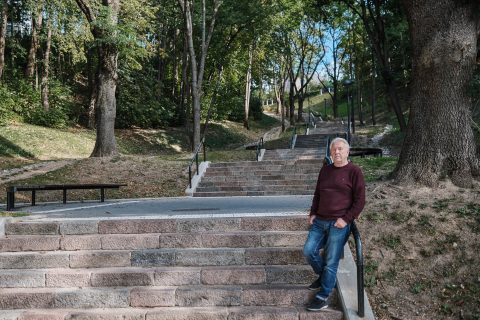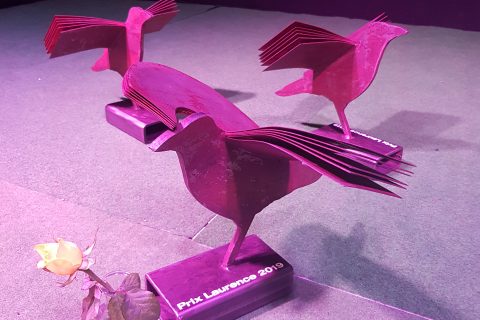We might know many things, but few can be proud of reading books only in their original language. Also, not many people would recognize a person on the street, who made the most memorable heroes of fiction and historical figures speak Lithuanian. Writers’ portraits can often be found on book covers and translators, although in the shadows, are also crucial players in the book world.
Of course, Vytautas Dekšnys from Vilnius also belongs to the Lithuanian Writers’ Union and thanks to his colleagues, his poems also speak different languages. We met to talk about that process, which is rarely spoken of in public – translations from Polish, Czech, Ukrainian and Belarusian languages. By the way, together with Marius Burokas, a member of Kaunas Literature Week’s team, V. Dekšnys is preparing an almanac of Belarusian poetry. But we will hopefully touch upon that on some other occasion.
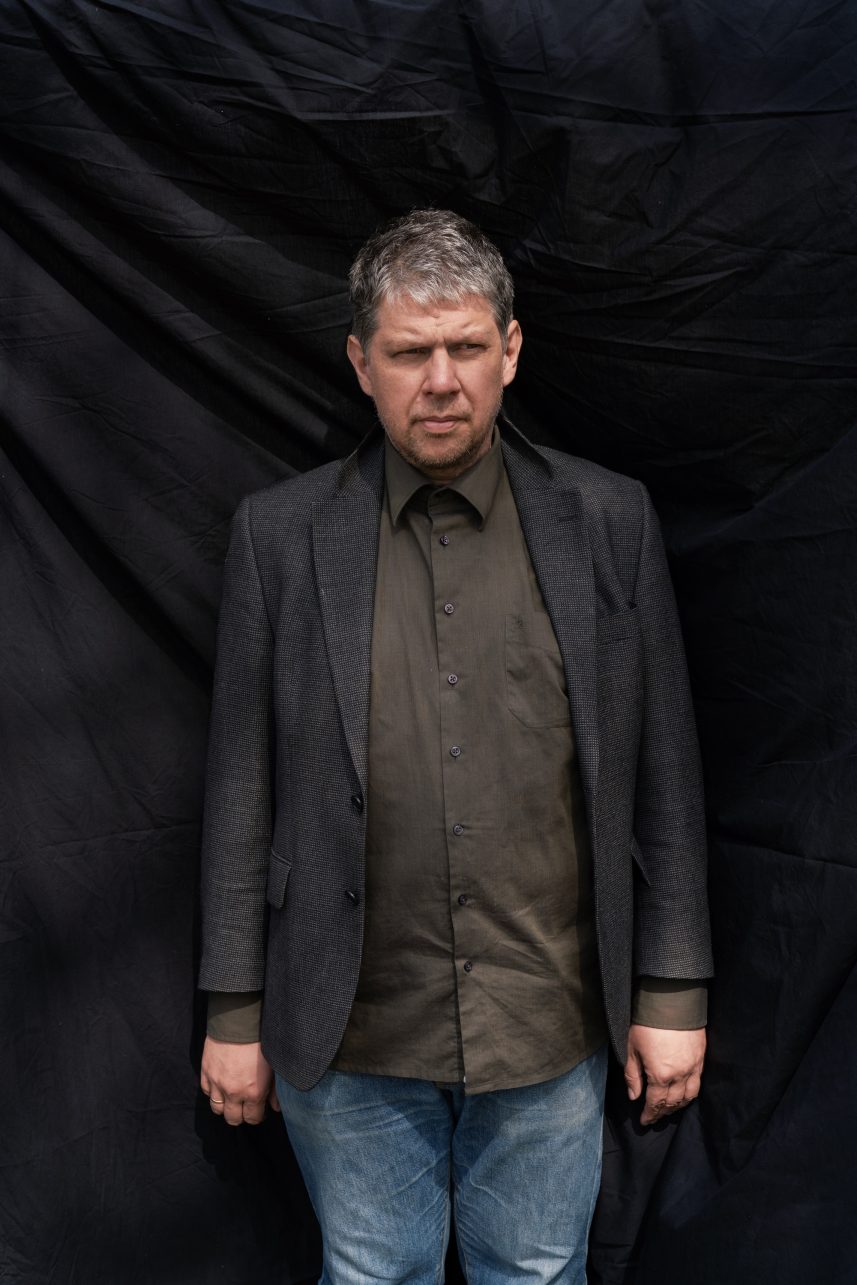
Since we have come into contact just before Kaunas Literature Week, first and foremost, tell us how you – both as a translator and as a reader – feel at various book and reading fairs, festivals and presentations? Do you look forward to such events?
It depends. I’m not always comfortable at book fairs, my inner introvert is suffering. But I gladly visit the events of smaller scale, like Druskininkai Poetic Fall and Poetry Spring. I am not so unsociable as to not go to any event but there is a certain amount of discomfort in large-scale events.
Is it a stereotype that many translators and writers get used to being alone due to the specifics of their work and the atmosphere of the fair does not necessarily coincide with how they feel inside?
There is some truth to that. This kind of work is usually chosen by more introverted people, but it all depends on the mood. For example, we would go hang out to Kitos Knygos stand at the book fair. It was a point of attraction, where friends and acquaintances came together, and the anxiety caused by the masses faded. The interaction may have had some bohemian elements to it.
The middle generation Belarusian prose writer Viktar Martinowich will participate in Kaunas Literature Week. During the protests in Belarus, the youth was taking photos en masse with his novel Revolution. You have translated an excerpt from the novel. Did you offer that to the festival yourself?
No, it was the organizers’ idea. Martinowich’s book was interesting but it is not the literature that I find particularly attractive. It’s good popular literature but I do not translate it because of my calling. Of course, such work cannot be called unpleasant.
You know, there are books that you read and then say, “Oh, we definitely need this,” and you know that you will feel pleasure in translating it. For example, this happened with the Ukrainian Serhiy Zhadan; I got immediately hooked.
When you happen to discover an author whose translation and publication you initiate, it seems a bit like an agent’s job, right?
Yes, especially at the beginning of my career, worked almost exclusively with such authors. I read mountains of literature and went to publishers. Now, perhaps, I have lost the energy but on the other hand, with experience come the offers from publishing houses. Sometimes they coincide with what I would like to do. Maybe the ability to wonder has disappeared over time? As I read more and more, I keep thinking about whether this or that is truly necessary. Maybe a decade ago I would have run to the publisher with such a book.
How did you become interested in languages that are geographically and culturally close to Lithuanians? After all, most people in Lithuania know Russian, sometimes Polish, but your knowledge is much broader.
I developed a more serious relationship with Polish during my philosophy studies, although I had encountered it before. I’m from the generation that listened to Polish radio stations because they broadcast more interesting content than our Soviet ones. When we visited relatives in Kaunas, we also watched their TV, which was also different. My mother sometimes bought the magazine Kobieta i Życie. She didn’t read in Polish, but it had clippings. As a child, I would turn a few pages and when I discovered a different language, I wanted to know what was written there. You try to use your Russian language skills, and you understand something, but the larger part remains unintelligible, but you’re still hooked.
And while studying philosophy, I saw that university and now Vrublevskiai library has the Polish translations of philosophical publications I need. Lithuanian publishing was scarce at that time, I would only find bits and bobs in Russian. There was a lack of books, so I grabbed everything I could. So, I learned to read Polish from philosophy textbooks. Then everything grew into doctoral studies in Warsaw. Newspapers also contributed there. Around the year 2000, Poland experienced a boom of good quality press. I read the daily Gazeta Wyborcza, the weekly magazine Tygodnik Powszechny. And then you come back home, open Lietuvos rytas and feel sad. Now, things in Poland had taken a turn for the worse, people no longer read long articles. I must mention the Polish school of reporting, where a journalistic text turns into literature, both because of the material and because of the writing style. Ukrainians try to develop this genre both by translating Poles and by supporting their authors, but in Lithuania this genre is not developed and is not well known. Dovydas Pancerovas is trying to do something about it, Audronė Urbonaitė has written a bit but you cannot call that a school.
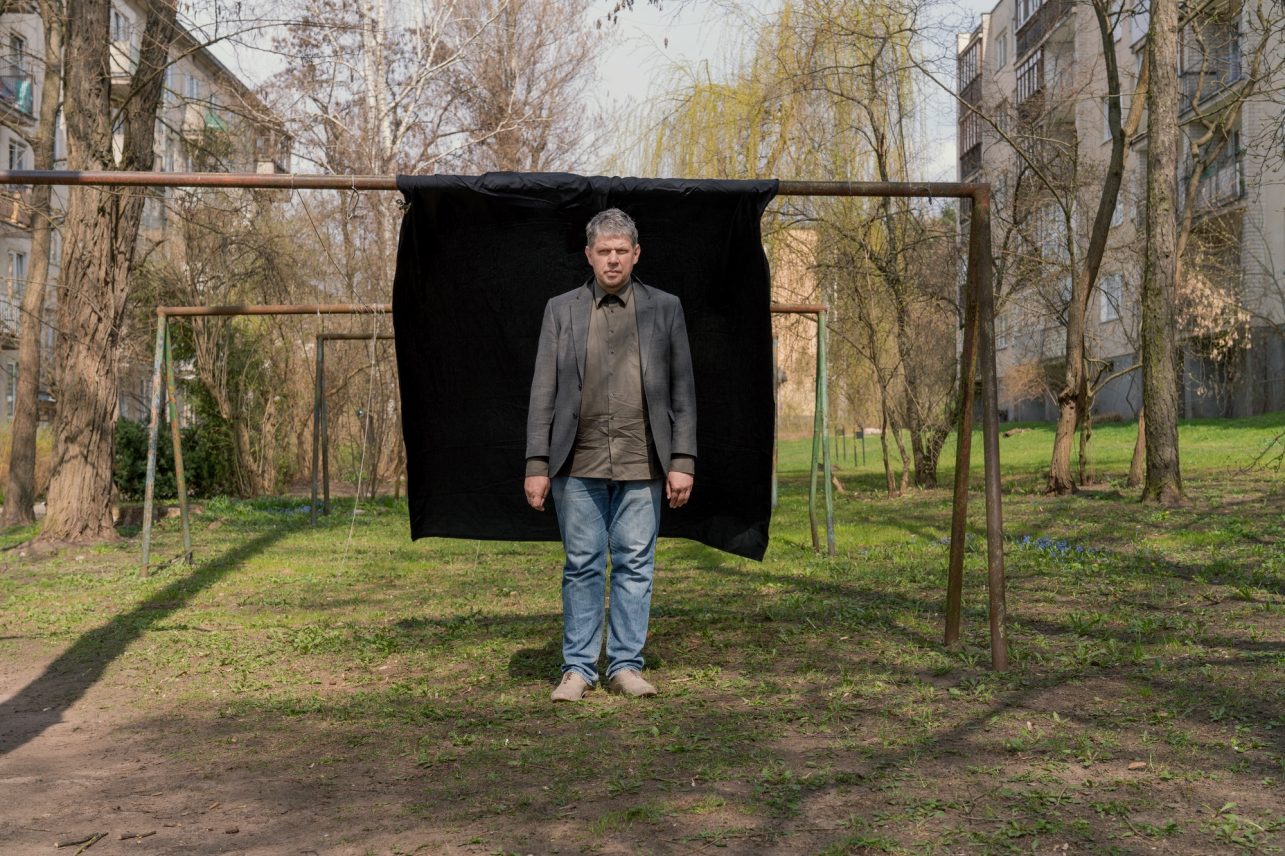
So, it is clear how you learned Polish but what about Ukrainian, Belarusian and Czech? Or it’s like a snowball effect?
Yes, it snowballed. Back in the same year 2000 I found a wide range of Eastern European topics in those Polish newspapers. In Lithuania they had flashed around 1989–1990, when the upheavals took place in Poland, Czech Republic, Romania and elsewhere. But we soon moved to the Western topics and our neighbors disappeared from the public discourse. But it didn’t disappear from my discourse. So, I read the Polish press and thanks to it I was able to check on Czechs, Hungarians and Ukrainians. They tried to support Belarus and Ukraine before there were any prominent opposition movements and after. For example, the Orange Revolution was covered in the Polish press in a much more diverse way than in ours. And during the last Maidan, Lithuanian society was also involved, so the events were covered not only “officially”; the approach was no longer as stereotypical as before.
Thus, the conditions for the literature of the neighbors are now more favorable than in, say, 2006 when no one knew Zhadan and only 300 copies of his book were sold. When he came to Lithuania in around 2016, only a few people came to his presentation.
What can we learn about ourselves by reading our neighbors’ literature?
A lot of things become clear; I think. When reading Poles or Ukrainians, I always look for the Lithuanian cliché. Well, when we say that such nonsense is only possible in Lithuania. It is easy to see that nonsense, complexes and issues are common to our geographic location. Not to mention the common compassionate things that we find in Western literature as well. Of course, good literature is personal, and each time affects you differently.
If we share similar issues with our neighbors, are our literary trends also alike?
Not really. All the time we are stuck between the old days, the glorious past and the desire to be progressive, to keep up with Western fashions. Everyone has some historical grievances. Social problems are similar. I think there are many common vectors.
Does your knowledge of the Lithuanian language improve as the amount of your translations increases? Do you pay some attention or extra time to that?
I don’t spend extra time on that, but it happens by itself, first of all by working with editors. We aim to make the language smoother, to make it less clumsy. After all you get affected by the original and you must detach yourself from these structures, the sentences that do not sound natural in Lithuanian. The editors help clear that up. The best editors have linguistic intuition and do not interfere with things that don’t need that sort of interference. We use the principle of dialogue in our work, and I am fortunate to communicate with experienced editors, who had edited hundreds of texts, they see where they can help and where it is better to not intervene. The inexperienced ones usually do not correct anything.
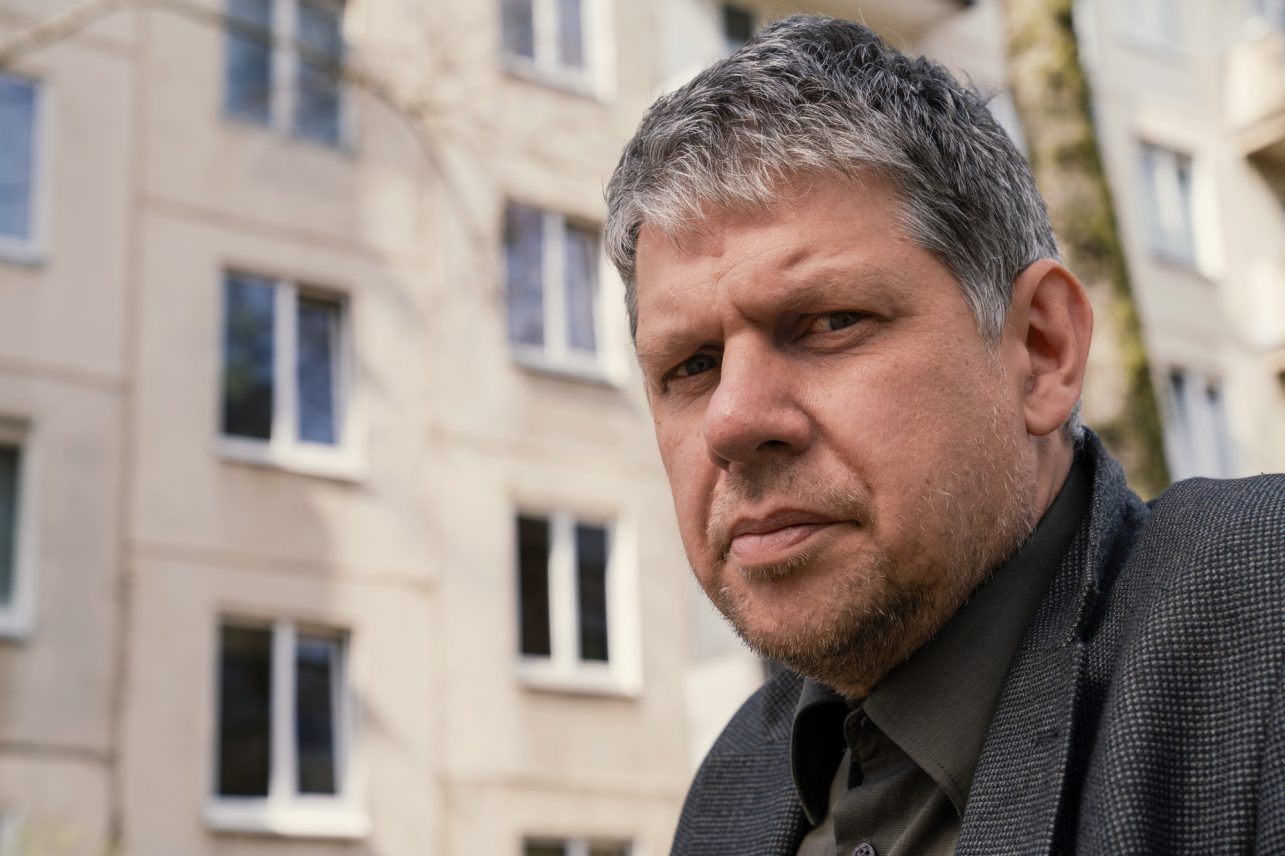
Although it is not your translation, but the book that really stuck with me is Der Goalie bin ig by a Swiss Writer Pedro Lenz. The book was written in slang spoken in Bern. It was translated by Rimantas Kmita and Swiss translator Markus Roduner and not just into Lithuanian but into Šiauliai dialect. I was fascinated by such a smooth, playful adaptation of one (sub)culture to another. How do you manage to work with colloquial language, jargon, modern dialects, geographically specific meanings?
When translating colloquial language, what matters most is not precision but making the text sound natural. One of my first translations was Dorota Masłowska’s Polish-Russian War. It had a constant flow of jargon. If I had tried to translate it very philologically and precisely, I would probably had broken my neck looking at dictionaries. And maybe I would have never found what I was looking for. I translated in one breath at the time without any worry. I translated in a way I thought it should look like and I wanted the text to flow.
I think that those who read it, appreciate it, and it’s more important than conveying every subtlety of the original jargon. Maybe if I opened it now, I would find mistakes, but it’s not the most important thing. Certain skills and language tools come about when you work, when you can translate closer and closer to the original yet still smoothly. Nothing good will ever come out of translating the text word by word.
You can do many things if you trust your intuition.
Is this more relevant when it comes to poetry?
Usually, if you follow everything literally when translating poetry, there might be no poetry left. But how to stay true to the original? You won’t be able to do that either, although it will seem like everything was preserved. Translation of prose or documentary fiction is a bit different. Of course, there is a Lithuanian, Polish and Ukrainian sentence structure, you won’t go far when translating in foreign constructions but when you learn to flip the sentence, you can come very close to the original.
Am I right to say that you often have the privilege of communicating with an author to clarify why they write the way they do?
If the living author is nearby then it often happens that they can explain several points in the whole large book. Sometimes it is useful to cooperate with a translator that translates from the opposite language, for example, when translating from Polish to talk to a colleague, who is translating from Lithuanian into Polish. You can learn many interesting things.
How deep must the understanding of the cultural and social context be in order to translate a literary text well? Here I recall the recent case of Amanda Gorman’s poetry translation (that didn’t happen) into Dutch (she read her poems at the inauguration ceremony of US President Joe Biden). The translator was refused because she is not from the same environment.
To be frank, I have not read Amanda Gorman, so I have no idea how things should be. But… Can you translate Dalia Grinkevičiūtė without having been exiled and imprisoned in Siberia? Can you translate Balys Sruoga without having been a prisoner in Stutthof? This requires going through some common human experience. A person has empathy, which is limited, and a translation is never ideal. But you can do many things if you trust your intuition.
What are you translating now? Maybe a new book is already on its way to the shelves?
I am finishing up an autobiographical novel by Jindřich Mann. Jindřich Mann is the grandson of the German writer Heinrich Mann (brother of Thomas Mann, ed.). He describes the history of his family, closely related to the history of the Czech Republic, so it is like a memoir, but also an overview of the epoch. it should be interesting to those who want to understand the history of Central Europe through the eyes of a family of intellectuals, on a human level. His mother and grandmother fled to Czechoslovakia during the Hitler regime and remained there. So Jindrich is already a Czech writer. By the way, in 1968 he found himself in Germany again. The novel was proposed to me by the publishing house, and it is the first book I am translating from Czech without having the opportunity to clarify it by looking at some other translations to different languages. it was quite a challenge! Sofoklis will probably publish the Lithuanian translation at the beginning of next year.
I am also starting to translate Serhiy Zhadan’s novel The Orphanage. I offered this book to the publishers myself. This is a very serious book about war. Not so much about military operations as about the civilians in the war, about the atmosphere of confusion, fear, ignorance. When the residents of an apartment block one day suddenly move to the basement of the same apartment building. When you travel through the city in secret, zapping across intersections that can receive fire. How the assessment of the political situation changes when a person realizes what their country is and which side they should be on. All that is told through very subtle emotional things.

